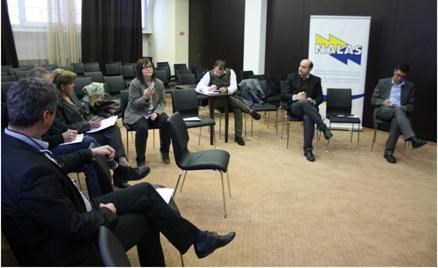
The five NALAS Task Forces in: Urban Planning, Energy Efficiency, Fiscal Decentralization, Water and Solid Waste and Sustainable Tourism are at the heart of NALAS, bringing together the best experts from the region, competent associations’ staff and professionals employed in the local government administration, who are directly facing the consequences and challenges coming from policies and laws which define the system of local government. NALAS Task Forces have a key role in knowledge production and dissemination.
Through an interview with Ms. Claudia Pamfil, we present to you NALAS Task Force on Urban Planning, a very active and productive group, that works to boost urban development of SEE.
“By working together on building creative and innovative approaches to urban development, the learning process is more efficient and our Region can better capitalize the learning outcomes”
Ms. Claudia Pamfil (claudia.pamfil@gdl.ro) is a member of the NALAS Task Force on Urban Planning, representing the Romanian Association of Communes. Ms. Pamfil is an Architect and Urban Planner. She is a professional technical assistance provider, trainer and project manager in areas related to integrated urban development, urban management, decentralization and public administration reform with experience in more than 12 countries. She continuously promotes community engagement in local public policies in general and urban planning in particular. Ms. Pamfil is the author of Evolving Intergovernmental Relations for Effective Development in the Context of Regionalization (published by Local Government and Public Reform Initiative – LGI Studies, Budapest, Hungary, 2003) that structured existing debates in different local and regional economic development approaches in Central and Eastern European countries and of various articles in the World Bank Institute Magazine, the Newsletter of the Network of Institutes and Schools for Public Administration in Central and Eastern European Countries, Public Administration in Romania Magazine, as well as European Urban Knowledge Network –EUKN (The view of… Claudia Pamfil: Local governments are not doing enough to encourage citizens to participate, June 2010).
Q: Your country is preparing for the new EU programming period 2014-2020. What are the key urban development challenges that need to be addressed?
A: Probably the most challenging aspect would be to facilitate the development process (and to ensure its territorial dimension) in a different manner than a supply-driven approach. So far, the discretionary, politicised and uncoordinated way of channelling the resources has deepen the territorial imbalances – therefore, in my opinion we are in an unfortunate situation of rather correcting the previous endeavours, and more deeply the institutional system, instead of building on what was previously done. Even we are late, I think it would be better to make several steps back trying to rearrange the planning and policy making process itself toward a more inclusive and integrated one. I’m not sure to what extent the Romanian Government is ready to tackle directly the dysfunctional aspects in this respect, but I hope a certain redesign will take place in order to stimulate for real the horizontal and vertical partnerships and associations at territorial, inter-institutional and inter-sectoral level. And I also hope that redesigning process will go in deep – as for example the regionalization – to find the most appropriate way of responsibilities and mirrored resources allocation as to achieve economy of scale along with communities’ active involvement.
Q: In what way can the NALAS Task Force on Urban Planning support urban development throughout South-East Europe?
A: First of all, it is about a kind of fight against the difficulty of being alone climbing mountains… so it is about helping each other by coordinating exchanges to make things happen. And making them happen in the same or similar pace throughout the SEE Region. By disseminating information and outputs, as well as by working together on building creative and innovative approaches to urban development, the learning process is more efficient and our region can better capitalize the learning outcomes.
Q: How do you see your participation in the NALAS Task Force on Urban Planning? What does this mean to you personally and to your Association?
A: I am continuously impressed by the positive energy of the Task Force on Urban Planning members and I try to contribute with my own – definitely stimulated by the group and the information that everyone brings as expert and as representative of his/her Association. We have the opportunity to touch so many interesting and challenging topics – such as data & information systems for planning, land management, social impact of the spatial planning, fiscal policies as tools for urban management, mobility and accessibility, etc. Our interaction and mutual projects makes me understand better the situation in my own country and also helps me to be better equipped to propose future initiatives, in line with the regional “symphony”, to the Romanian Association of Communes which I proudly represent. It is definitely a colour and a sound that makes us evolve. Stronger.